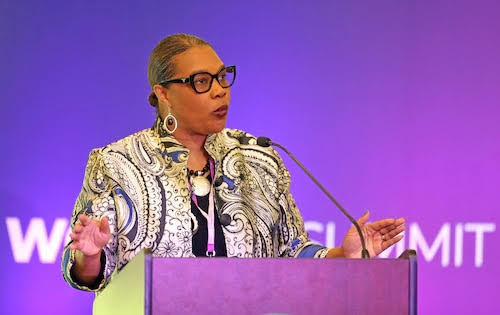Dr. Airica Steed is a trailblazer in healthcare leadership, renowned for her unwavering dedication to equity and innovation. She made history as the first woman, first Black person, and first nurse to lead MetroHealth as CEO in its nearly 200-year history. Her legacy is etched into the DNA of MetroHealth, and the transformative changes she implemented will resonate for generations to come.
Dr. Steed has also held esteemed positions such as System Executive Vice President and Chief Operating Officer at Sinai Chicago and President of Mount Sinai and Sinai Children’s Hospital. Her leadership is marked by a commitment to addressing systemic inequities, fostering organizational resilience, and driving innovation. Through groundbreaking initiatives, she has championed preventative care, improved community outcomes, and delivered cutting-edge solutions that prioritize both patients and employees.
Healthcare Leadership and Modern Challenges
What key strategies do you recommend for healthcare leaders to effectively address the financial stressors and workforce shortages facing the industry today?
Financial instability and workforce shortages have become unyielding challenges in healthcare, and navigating them requires both resilience and foresight.
One key strategy is the creation of diverse revenue streams that go beyond the traditional healthcare business model. This enables a more sustainable and adaptable future in an increasingly volatile economy. We must also embrace change management and continuous improvement approaches, like Lean Six Sigma, to drive efficiency while simultaneously enhancing revenue.
For workforce shortages, I believe in a multifaceted approach: upskilling current employees, creating a purpose-driven culture, and developing long-term talent pipelines through partnerships with academic institutions. We must also cultivate environments that support employee well-being, including mental health support and inclusive leadership that ensures every voice is heard and valued.
How can healthcare organizations balance the integration of cutting-edge technologies, such as AI and telemedicine, while ensuring their workforce feels supported and empowered rather than overwhelmed?
Technology should be a tool for empowerment, not a burden. The key is intentional, transparent communication and training. Organizations must explain not just what technologies are being introduced, but why — and how they benefit both patients and employees.
We should engage the workforce early in the design and implementation phases, ensuring that the technology is aligned with clinical realities. When people understand that tech is meant to enhance their impact rather than replace them, it becomes a source of optimism rather than anxiety.
Dr. Airica Steed’s Legacy at MetroHealth
You made history as the first woman, nurse, and person of color to lead MetroHealth. How did that shape your leadership and what does your legacy mean to you?
My leadership at MetroHealth was about more than holding a title — it was about shattering concrete ceilings, overcoming the glass cliff, and showing others what’s possible through the power of resilience and purpose.
Being the first in nearly two centuries to hold this role meant I had a profound responsibility. I prioritized embedding equity, inclusion, and representation at every level. I launched mentorship and sponsorship pipelines, ensuring that future leaders would reflect the diversity of the communities we serve. My legacy is about opening doors, breaking barriers, and leaving a lasting blueprint for how inclusive, people-centered leadership can drive transformational change.
During your tenure as CEO of MetroHealth, you emphasized health equity and dismantling socio-economic barriers. What were some of the most impactful initiatives you implemented to achieve these goals?
Leading MetroHealth offered the opportunity to redefine how we care for underserved communities. One of our most impactful initiatives was integrating social determinants of health into every facet of our care model. Healthcare can’t succeed in isolation — we must also address housing, food insecurity, employment, and education.
We partnered with local organizations to connect patients with safe housing, job training, and food access, reducing health disparities by tackling root causes. Just as importantly, we unlocked the voice of the community — inviting them into conversations about care delivery. At MetroHealth, we treated the entire community as the patient, understanding that wellness is a shared responsibility.
Can you share a specific program you’re particularly proud of that impacted community outcomes?
One standout initiative is our maternal health program for communities of color, who face alarming disparities in maternal mortality. We provided wraparound support, including clinical care, nutrition, mental health services, and social resources.
Most importantly, we co-designed solutions with community input — listening, learning, and partnering every step of the way. This led to measurable improvements in health outcomes and deepened trust in healthcare systems that historically excluded these voices.
Vision and Personal Leadership Philosophy
Your leadership philosophy is founded on a people-first culture. How can other healthcare leaders implement this framework to empower their employees and improve organizational outcomes?
A people-first culture is about leading with empathy, integrity, and authenticity. It means prioritizing people over processes, without compromising outcomes. Leaders must be present, listen deeply, and respond to employee needs with action.
This includes open communication, regular recognition, and a commitment to professional development. High-performing organizations are built on trust and psychological safety, where every individual knows they matter and has room to grow.
Having personally experienced the impact of healthcare disparities, how have these experiences shaped your commitment to health equity and your vision for the future of American healthcare?
Healthcare disparities are not statistics for me — they’re deeply personal realities. I’ve lost loved ones to preventable conditions that exposed the inequities baked into our system. These experiences are what fuel my passion.
My vision for healthcare is one where we create equity at the foundation, not as an afterthought. We must invest in preventative care, community-based services, and sustainable systems that allow every person — no matter their race, income, or zip code — to thrive. It’s about building health and wealth together, empowering communities as partners in their own care transformation.
A Final Word from Dr. Steed
To every aspiring leader, especially those who feel unseen or underestimated: resilience is your superpower. I’ve faced adversity, shattered concrete ceilings, and overcome the glass cliff — not just for myself, but to make space for the next generation.
Let no one define your worth or limit your vision. You have the power to lead, to innovate, and to transform. My journey is proof that when purpose meets preparation, anything is possible — and legacy is built not just in titles, but in impact.




